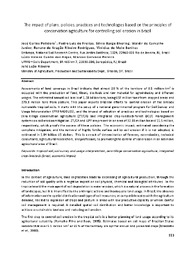The impact of plans, policies, practices and technologies based on the principles of conservation agriculture for controlling soil erosion in Brazil.
The impact of plans, policies, practices and technologies based on the principles of conservation agriculture for controlling soil erosion in Brazil.
Author(s): POLIDORO, J. C.; FREITAS, P. L. de; BHERING, S. B.; CARVALHO JUNIOR, W. de; RODRIGUES, R. de A. R.; BENITES, V. de M.; ANJOS, L. H. C. dos; PEREIRA, M. G.; RIBEIRO, J. L.
Summary: Assessments of land coverage in Brazil indicate that almost 28 % of the territory of 8.5 million-km2 is occupied with the production of food, fibers, bio-fuels and raw material for agroindustry and different usages. The estimated annual soil loss is of 1.18 billion tons, being 697 million tons from cropped areas and 270.8 million tons from pasture. This paper reports Brazilian efforts to control erosion of the already vulnerable tropical soils. It starts with the setup of a national governmental program for Soil Survey and Usage Interpretation (PRONASOLOS), and the impact of adoption of practices and technologies based on zero tillage conservation agriculture (ZT/CA) and integrated crop-livestock-forest (iCLF) management systems on soil erosion mitigation. ZT/CA and iLPF are present in an area of 32.88 million ha and 11.5 million, respectively, which proofs the success of these policies. The economic impact, estimated considering the complete mitigation, and the removal of highly fertile surface soil by soil erosion if it is not adopted, is estimated in 1.84 billion US dollars. This is a result of determination of farmers, extensionists, technical consultants, agricultural researchers, and professors, to promoting the control of soil erosion in an extensive agricultural area of Brazil.
Publication year: 2019
Types of publication: Paper in annals and proceedings
Unit: Embrapa Soils
Observation
Some of Embrapa's publications are published as ePub files. To read them, use or download one of the following free software options to your computer or mobile device. Android: Google Play Books; IOS: iBooks; Windows and Linux: Calibre.
Access other publications
Access the Agricultural Research Database (BDPA) to consult Embrapa's full library collection and records.
Visit Embrapa Bookstore to purchase books and other publications sold by Embrapa.

